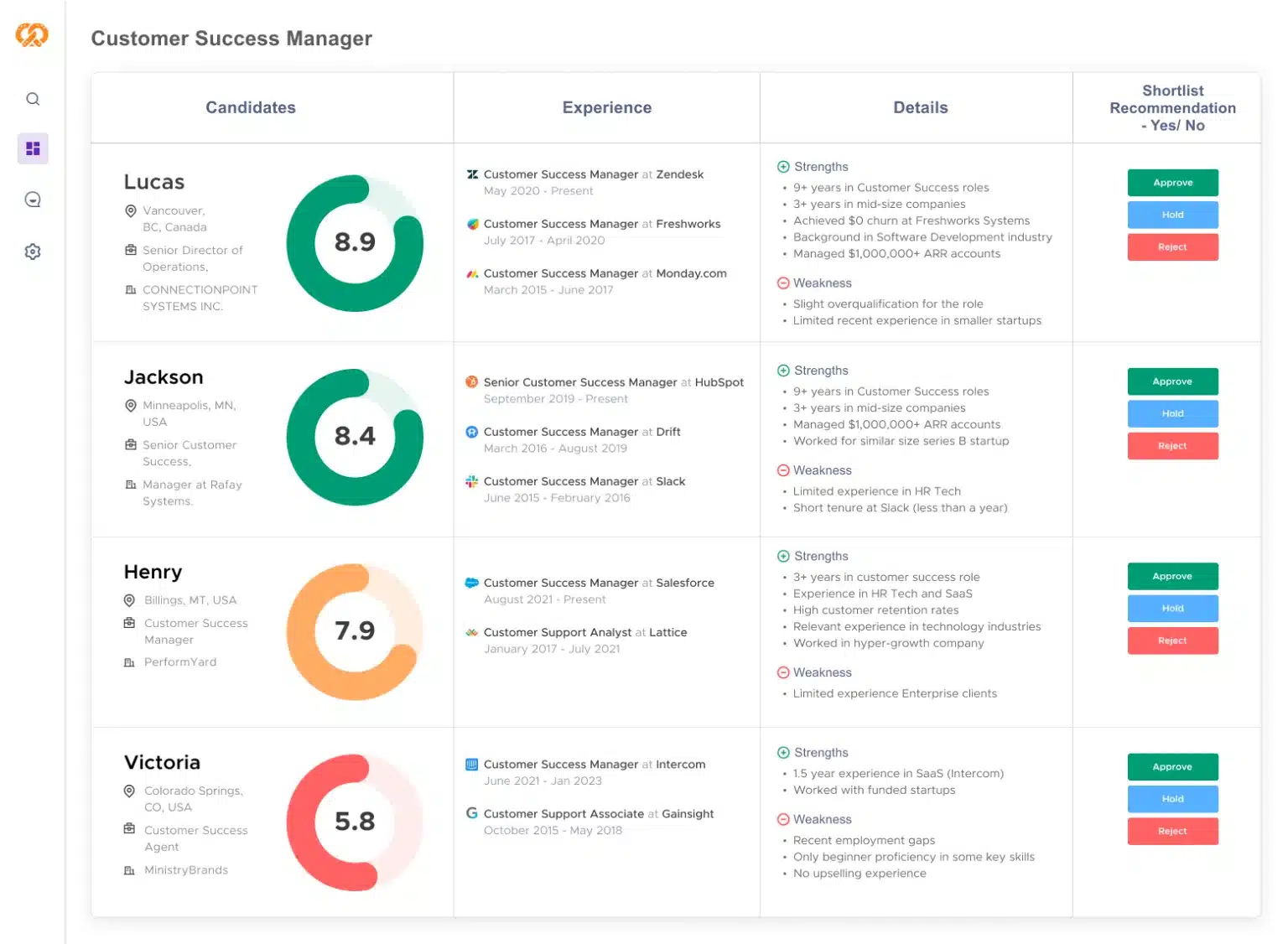The voluntary quitting rate is 25% higher than that of the pandemic. In this scenario, making poor hiring decisions can be costly, financially and strategically. The wrong hires waste resources and affect team morale, productivity, and even the company’s reputation.
This is why a well-executed recruitment and selection process is vital. The recruitment process is more than just filling positions; it’s about finding candidates who align with your company’s vision and have the skills to drive growth.
The selection and recruitment process is about building a talent pipeline that meets immediate needs and supports long-term business goals.
In this blog, we talk about the key function of recruitment and how it benefits your organization.
What is Recruitment?

The recruitment process helps businesses identify, attract, and hire candidates to fill specific roles within their organization. The function of recruitment is to connect the organization’s needs with potential employees who can meet those needs and align with the company’s goals and culture.
An effective recruitment process extends beyond merely filling vacancies; it is about attracting individuals who possess the right skills, experience, and mindset to help the organization achieve its objectives. Effective recruitment is key to ensuring long-term success as it influences employee engagement, retention, and overall business performance.
Steps Involved in an effective recruitment process
The recruitment process includes the following key stages:
1. Identifying hiring needs
HR and department managers identify the skills, experience, and qualifications required for the position. This ensures the company understands both its current and future talent needs.
2. Job description and specifications
You create clear and accurate job descriptions to minimize mismatches between candidates and job expectations.
3. Source candidates
Attract potential candidates through multiple channels such as online job boards, social media, internal promotions, referrals, and recruitment agencies.
What is Selection?

The selection process is a critical step that follows recruitment, aimed at identifying the most suitable candidates from the pool of applicants. While recruitment focuses on attracting many qualified individuals to apply for a position, selection is a refining process that evaluates and narrows down these candidates to choose the one best aligned with the job requirements and organizational culture.
The goal of selection is to match qualifications and experience and ensure the right cultural fit and alignment with company values, which is essential for long-term success.
Steps Involved in Selection
1. Conduct Preliminary screening
In this step, you eliminate unqualified job seekers based on minimum requirements like educational qualifications, work experience, or specific skills. This ensures that only serious contenders move forward.
2. Testing and assessments
Depending on the role, job seekers may undergo a range of tests, including technical assessments, psychometric tests, or personality evaluations.
3. Conduct Interviews
Assess candidates‘ behavioral traits, communication skills, and overall compatibility with the company culture. This can include panel interviews or interviews with higher management.
4. Check backgrounds and references
Before finalizing a candidate, conduct background checks and speak to references to verify the information provided by the applicant and assess their previous work performance.
5. Finalize the candidate
After all the tests, interviews, and checks, the selection team assesses the candidate’s overall performance in relation to job expectations. The decision to hire is often based on how well the candidate aligns with the role’s technical demands and the organizational culture.
Also read: Ultimate guide to AI in recruitment and 15+ Best Recruitment Analytics Software in 2024
10 key points highlighting the importance of the recruitment and selection process in achieving business results
There are many benefits of creating a robust recruitment and selection process:
1. Attracting top talent
A strong recruitment process helps you attract top candidates from a large talent pool and find the right person for the job. A thorough selection process filters the most skilled candidates from many resumes and allows companies to build a capable, motivated, and forward-thinkingworkforce.
The top talent excels in their role and shapes the company’s strategic direction. By recruiting high-performers, businesses increase their chances of fostering innovation, creativity, and a competitive edge.
2. Increased retention and reduced turnover
Sometimes, hiring managers look for candidates to fill an immediate vacancy. This may attract a misfit to the organization who doesn’t do the job properly or leave after a short time.
An effective recruitment process ensures you hire individuals who are well-suited for the roles and align with the company culture. This alignment reduces turnover rates, as employees are more likely to stay in a job where their values and skills match the organization’s needs.
To increase employee retention, you can use employee retention tools like Poeplebox. It offers advanced features for both employees and leaders. You can use 1:1 meetings to connect with employees, while employees can use anonymous messaging to share how they feel about their roles and responsibilities.

3. Cost efficiency
Hiring the wrong person can be expensive. Rehiring, retraining, and lost productivity when a position remains vacant can be costly.
The purpose of recruitment and selection is to minimize these costs by ensuring that the right candidate is chosen from the start. A well-organized process also reduces the time to hire, further enhancing cost efficiency.
4. Improved employee performance
When your recruitment process is thorough, businesses are more likely to identify candidates from a large talent pool who not only fit the role but can also excel in it. Employees well-suited to their positions are more engaged and productive, leading to higher overall performance.
This directly impacts business outcomes, as productive employees are more likely to contribute to business growth and success.
Selecting high-performing candidates also reduces the need for constant supervision and performance management, freeing up managers to focus on strategic tasks.
| 💡Pro tip: You can use Peoplebox’s performance review tool to monitor your employees’ performance. |
5. Competitive advantage
Companies that consistently hire the best people position themselves to outperform competitors by building a workforce that is innovative, adaptable, and capable of responding to market demands.
In a competitive job market, organizations with robust recruitment strategies can secure top-tier candidates from the talent pool before their competitors do, giving them an edge in talent acquisition and retention.
6. Cultural fit and alignment
Another purpose of the recruitment and selection process is to hire employees who align with the company’s values and culture, which is crucial for long-term success.
Candidates who fit well into the organizational culture are likelier to be engaged, motivated, and loyal to the company. This improves individual performance and fosters a positive work environment that enhances overall team dynamics.
7. Long-term business growth
Recruitment and selection are essential for ensuring the organization has the right talent to support its long-term objectives. When you hire individuals with the skills and potential to grow within the company, you ensure your company’s long-term growth.
Focusing on long-term talent acquisition strategies helps businesses build a resilient, forward-thinking workforce that drives business innovation and profitability.
8. Enhanced brand reputation
A positive recruitment and selection experience enhances the company’s brand reputation. When candidates go through a smooth, transparent process are more likely to speak positively about the company and it contributes to a stronger employer brand.
This reputation, built through fair and effective recruitment practices, attracts even more high-caliber candidates in the future.
9. Building a diverse workforce
Another purpose of selection is to find and select candidates from varied backgrounds, bringing different perspectives into the organization. By actively seeking diverse talent through inclusive job postings and fair selection practices, companies enhance creativity and problem-solving.
A diverse workforce, built through thoughtful recruitment and selection, helps your company serve a broader customer base and innovate faster. It also gives you a competitive edge in the market.
10. Ensuring legal compliance
One of the key function of recruitment is to help the company comply with labor laws, anti-discrimination regulations, and data protection policies.
HRs can guide companies about Equal Employment Opportunity (EEO) laws, which can prevent discrimination based on race, gender, or other protected characteristics, ensuring fairness in the hiring process.
You can also document the entire process to gain legal protection or prove that the organization adhered to relevant laws and regulations.
Suggested Read: The Ultimate Guide to High Volume Hiring
Start creating a Solid Recruitment Process with Peoplebox
As you read, the hiring process is critical in driving business results. It’s not just about creating job openings and filling vacancies—it’s about finding the right people who align with the company’s goals, culture, and vision.
A well-executed recruitment strategy helps write better job descriptions, attract top talent, and improve employee satisfaction and retention. Selection ensures that only the best candidates, those who fit the role, are chosen.
When it comes to resume screening, efficiency and accuracy are key to finding the right candidates. Peoplebox streamlines this process by offering a range of tools designed to help recruiters and hiring managers sift through resumes faster and with greater precision. With Peoplebox, you can optimize your screening process, ensure alignment with job requirements, and make better, data-driven hiring decisions.
Key Features of Peoplebox for Resume Screening:
- Automated Resume Parsing: Extract essential information such as skills, experience, and qualifications quickly and accurately.
- Customizable Screening Filters: Tailor your search criteria to specific job roles, focusing on key competencies and attributes.
- AI-Powered Candidate Matching: Matches resumes with job descriptions, helping you identify the best-fit candidates in seconds.
- Data-Driven Insights: Provides insights into candidate pools, highlighting trends and patterns to enhance decision-making.

With Peoplebox, resume screening becomes more streamlined, reducing time-to-hire and improving the quality of your recruitment efforts. You can find our product tour here.
Performance Review Platform
Get a glimpse of how Peoplebox make performance reviews painless, actionable and fair







